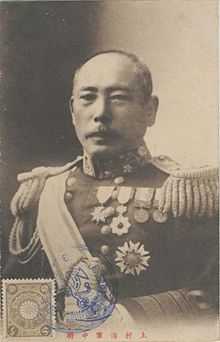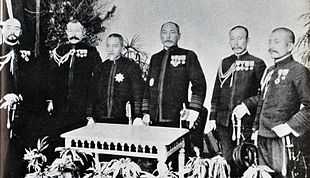Kamimura Hikonojō
| Baron Kamimura Hikonojō | |
|---|---|
 Japanese Admiral Baron Kamimura Hikonojō | |
| Born |
1 May 1849 Kagoshima, Satsuma domain Japan |
| Died |
8 August 1916 (age 67)[1] Tokyo, Japan |
| Allegiance |
|
| Service/branch |
|
| Years of service | 1871–1914 |
| Rank | Admiral |
| Commands held |
Maya, Chōkai, Akitsushima IJN 2nd Fleet, IJN 1st Fleet |
| Battles/wars |
Boshin War First Sino-Japanese War Battle of the Yalu River (1894) Russo-Japanese War Battle off Ulsan Battle of Tsushima |
| Other work | Supreme War Council |
Baron Kamimura Hikonojō (上村 彦之丞, 1 May 1849 – 8 August 1916) was an early admiral of the Imperial Japanese Navy later commanding the IJN 2nd Fleet during the Russo-Japanese War, most notably at the Battle off Ulsan and Tsushima.
Biography
Born to a samurai family in the Satsuma Domain (present day Kagoshima prefecture), Kamimura served as a foot soldier during the Boshin War. After the Imperial government was established in 1871, Kamimura became one of the first cadets of the Imperial Japanese Naval Academy, later earning a commission as an ensign following his graduation in 1879.
Serving as a junior officer aboard various ships throughout the 1880s, Kamimura’s first command was the gunboat Maya in 1891; he later captained the Chōkai in 1893.
After the outbreak of the First Sino-Japanese War the following year, Kamimura was given command of the new cruiser Akitsushima, winning distinction at the Battle of the Yalu River on 17 September 1894.[2] In his heyday, he was known throughout Imperial Navy as a gruff and bold combat leader in the old samurai tradition.
In the years following the war, Kamimura held a series of posts in the Navy Ministry as well as staff and fleet commands until his promotion to vice admiral in 1903. He visited Great Britain aboard the battleship Asahi from 1 February 1899 - 22 May 1900, during which time he became a rear admiral.
Placed in command of the IJN 2nd Fleet following the first months of the Russo-Japanese War, Kamimura was ordered to contain the Russian cruiser squadron based in Vladivostok. After the Russians escaped and sank Japanese troopships in the Sea of Japan (April and June 1904), he became the object of widespread popular dissatisfaction, with a mob attacking his Tokyo residence, and newspapers hinting that he should commit suicide. He vindicated himself in action by sinking the Russian cruiser Rurik and damaging the cruisers Gromoboi and Rossia on 14 August 1904 at the Battle off Ulsan, and regained his popularity both within the government and the Japanese public. Commanding from the cruiser Izumo, Kamimura later led the IJN 2nd Fleet during the Battle of Tsushima on 27 May 1905.
Appointed commander of the Yokosuka Naval Base in 1905, Kamimura was placed in command of the IJN 1st Fleet in 1909. Previously made a danshaku (baron) under the kazoku peerage system only two years before, Kamimura was made a full admiral on 1 December 1910. Becoming a member of the Supreme War Council the following year, Kamimura entered the reserve list on 1 May 1914, before his death in 1916.
His grave is at the temple of Myohon-ji in Kamakura.
Promotions
- 8 June 1877 - Midshipman (Shoi-Kohosei)
- 19 September 1879 - Acting Sub-Lieutenant (Shōi)
- 17 December 1881 - Sub-Lieutenant (Chūi)
- 8 April 1884 - Lieutenant (Taii)
- 17 September 1890 - Lieutenant-Commander (Shōsa)
- 7 December 1894 - Captain (Taisa)
- 26 September 1899 - Rear Admiral (Shosho)
- 5 September 1903 - Vice Admiral (Chujo)
- 1 December 1910 - Admiral (Taisho)
References
Books
- Andidora, Ronald (2000). Iron Admirals: Naval Leadership in the Twentieth Century. Greenwood Press. ISBN 0-313-31266-4.
- Dupuy, Trevor N. (1992). Encyclopedia of Military Biography. I B Tauris & Co Ltd. ISBN 1-85043-569-3.
- Paine, S.C.M. (2001). The Sino-Japanese War of 1894-1895: Perception, Power, and Primacy. Cambridge, MA: Cambridge University Press. ISBN 0-521-61745-6.
- Schencking, J. Charles (2005). Making Waves: Politics, Propaganda, And The Emergence Of The Imperial Japanese Navy, 1868-1922. Stanford University Press. ISBN 0-8047-4977-9.
- Warner, Denis; Warner, Peggy (1974). The Tide at Sunrise: A History of the Russo-Japanese War 1904-1905. Charterhouse. ASIN B000OLLNGA.
Notes
| Wikimedia Commons has media related to Kamimura Hikonojo. |
External links
- Kamimura Hikonojo at the Imperial Japanese Navy website
